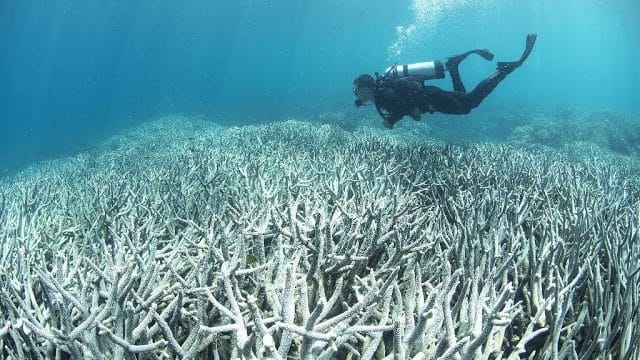Did you know that the iconic Great Barrier Reef had a huge set-back this year with massive coral bleaching – the largest bleaching event on record which affected almost 1000kms of reef? The Great Barrier Reef is in trouble – over 90% was affected this year. Actually reefs around the world have been devastated by human-induced global warming.
Living simply can help make a difference. If global warming, pollution, silting are some of the key things to blame, we need to ..
- reduce energy use
- reduce consumption
- reduce waste – compost, cut back on plastics, recycle
- eat local sustainably produced food
- educate as many as possible about the issue and ways to live more simply
 |
| Diver checking the bleached coral at Heron Island on the Great Barrier Reef – image from XL Catlin Seaview Survey. |
Over one quarter of the Great Barrier Reef has been severely damaged and overall 93% of the reef has been impacted by coral bleaching this year. This is disastrous for the diversity of life which depends on the reef.
 |
| Coral bleaching at Lizard Island, Great Barrier Reef: Image: May 2016 from XL Catlin Seaview Survey. |
The Great Barrier Reef is Earth’s most extensive coral reef – a World Heritage Site that we have committed to protecting. Healthy coral reefs are the most ecologically diverse habitats on earth and they also protect coasts from storms and waves. Although reefs are less than 0.1% of the world’s ocean floor, they help support around 25% of all marine species.
Please take a look at what’s happening. Dr Tim Flannery says that this is a result of what we are doing to the climate, and that we need to wean ourselves off coal very rapidly.
Read More: http://www.abc.net.au/news/2016-09-20/great-barrier-reef-coral-bleaching-dead-damaged-survey-finds/7859544
What can we do to help:
http://www.reefteach.com.au/about-the-reef/what-can-i-do-to-help-the-reef/
http://www.coolaustralia.org/challenges-and-solutions-for-the-great-barrier-reef/



I hope many people will read this, Morag. We took our son out to the Great Barrier Reef earlier this year, on a trip home to see my family. To him, this was a very special thing, to see the reef and the creatures that he had been learning about at school. Of course, we didn't go where the bleaching occurred but I can only imagine the devastation of the reef and of those who have seen that bleaching. What a loss losing such an amazing natural system would be. Meg